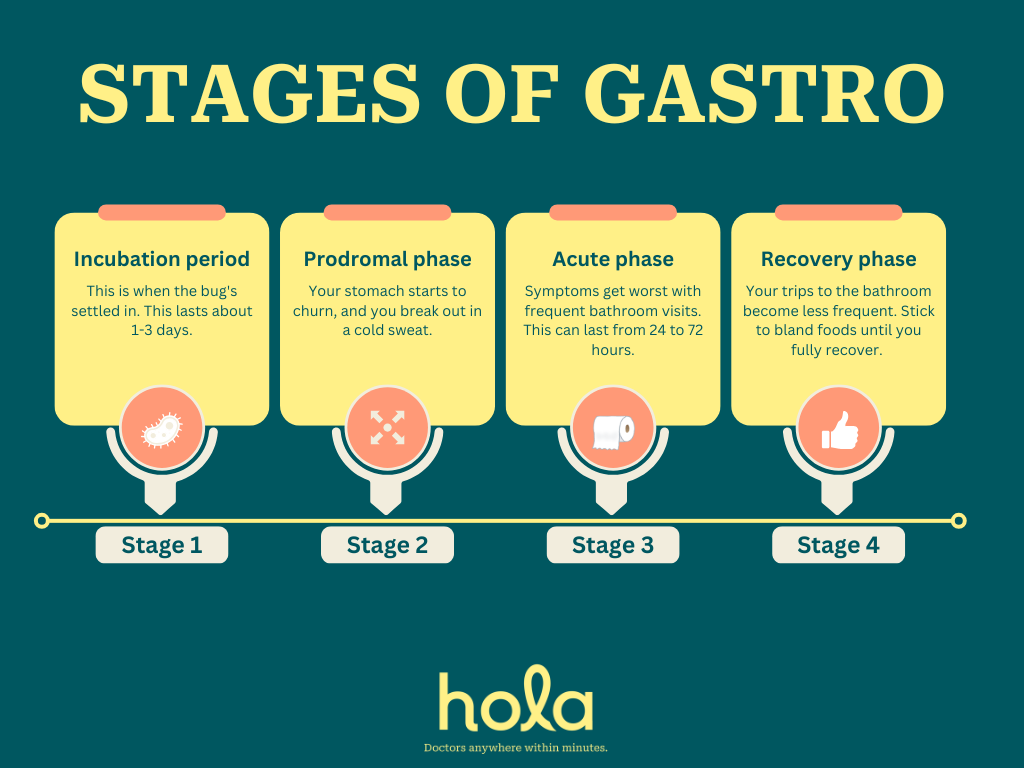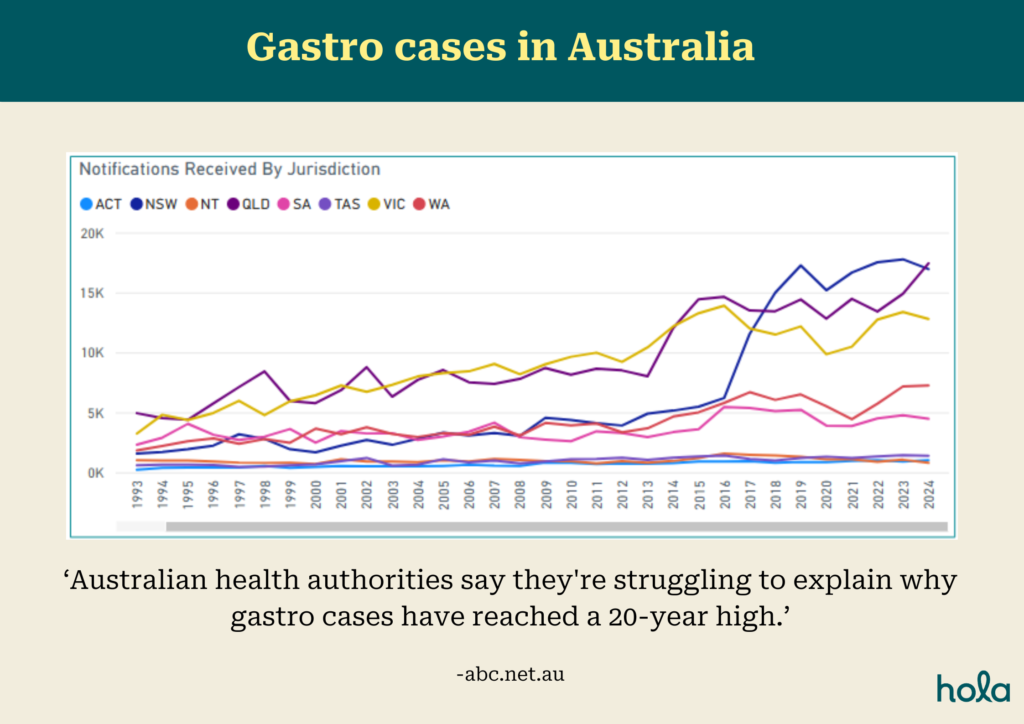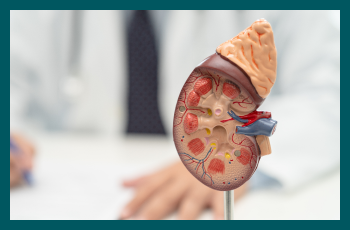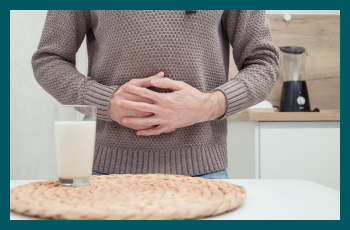Stages of Gastroenteritis in Adults
Written by Dr Nelson Lau, MBBS FRACGP, GP & Digital Health Specialist

Contents

What exactly is gastroenteritis?
Simply put, gastroenteritis is when your stomach and intestines get inflamed. Usually, it's thanks to a virus or bacteria that has entered your digestive system. Sometimes parasites or even food toxins can be the culprits. Whatever the cause, the end result is the same: a combination of diarrhoea, vomiting, cramping, and possibly fever. Let's break down how this uninvited guest typically overstays its welcome:
Let's break down how this uninvited guest typically overstays its welcome:
Incubation period
First off, there's the incubation period. This is when the bug's settled in, but you're blissfully unaware. For most stomach viruses, this lasts about 1-3 days. You're feeling fine, going about your business, maybe even wondering why your coworker called in sick.Prodromal phase
Then it hits you. Maybe you're sitting at your desk when a wave of nausea washes over you. Your stomach starts to churn, and you break out in a cold sweat. Now you've entered what's known as the prodromal phase. This is your body's way of telling you that things have just started and are about to get worse.Acute phase
This is when your symptoms are at their worst. You're running to the bathroom every five minutes and your stomach feels like it's trying to turn itself inside out. This phase can last anywhere from 24 to 72 hours, sometimes even longer if you're really unlucky.Recovery phase
You finally enter the recovery phase. The storm's passing, but you're left feeling washed out. Your trips to the bathroom become less frequent, and you might even start thinking about food again. Just stick to bland foods in the meantime until you've had time to fully recover.
Who is at risk?
While anyone can catch a stomach bug, some people are more likely to get more severe episodes:- The very young and the elderly
- People with weakened immune systems
- Those living in close quarters (such as dormitories and nursing homes)
Prevention tips: How do you avoid catching gastroenteritis?
The most important thing is to wash your hands! And this should be a proper scrub with soap, not just a quick rinse. This is especially crucial after using the bathroom and before you eat. If someone in your house is already down with gastro, use disinfectant. Clean the bathrooms and kitchen surfaces thoroughly. And make sure you don't share towels or utensils with the sick person as it's essential that you keep your distance for now. Prevention is always better than cure, so here are some more tips to keep you protected:- Get vaccinated: There are vaccines for some types of gastroenteritis, like rotavirus, especially for children.
- Cook your food thoroughly: Raw or undercooked food is a ripe playground for bacteria.
- Stay hydrated: This is especially important if you're traveling somewhere with questionable water quality.
When to consult a doctor?
Most of the time, gastroenteritis is like a bad houseguest - unpleasant, but it'll leave eventually. However, sometimes you need to consult the doctor. Here are the signs you should look out for:- If you're very dehydrated (signs include severe thirst, dry mouth, minimal passing of urine, and feeling dizzy)
- If your symptoms are still severe after a week
- If you're running a fever over 39°C
- If you see blood in your stool
Telehealth options
You don't necessarily have to drag yourself to the doctor's office when you're feeling sick with gastro. Many healthcare providers offer a virtual doctor's appointment where you can video chat with a doctor from the comfort of your own home. They can assess your symptoms, suggest treatments, and even prescribe medications to help with nausea or diarrhoea.Frequently Asked Questions about gastro
How long does gastro typically last?
The whole episode usually runs its course in about a week, give or take. But the worst of it (the acute phase) is usually over in 1-3 days.
When is gastro at its peak?
The acute phase is when you'll be feeling your absolute worst. This is prime time for staying close to the bathroom which you will be visiting frequently.Is diarrhoea the last stage of gastro?
Not necessarily. While the diarrhoea does tend to stay around for most of the acute phase and into the recovery phase, it's not always the last symptom to go. Everyone's gut has its own timeline.How can I tell if things are going from bad to worse?
Keep an eye out for signs of severe dehydration, persistent high fever, symptoms that last more than a week, or blood in your stool. If you see any of these, it's time to call the doctor.What are the first signs that I'm about to be hit by gastro?
Usually, it starts with sudden nausea and stomach cramps. You might also feel generally unwell and weak. Remember, while gastroenteritis is common, it's no walk in the park. Knowing what to expect can help you manage it better and know when to seek help. Keep yourself and your surroundings clean, and don't hesitate to reach out to a healthcare provider if things seem to be taking a turn for the worse. Reference- Gastro cases in Australia - ABC News
- Australian Government Department of Health and Aged Care

Consult an Online Doctor in 15 mins
- Speak to an Australian-registered health practitioner
- Telehealth appointment available 24 hours a day, all year round
- Request scripts, med certs, referrals or get medical advice


Consult an Online Doctor in 15 mins
- Speak to an Australian-registered health practitioner
- Telehealth appointment available 24 hours a day, all year round
- Request scripts, med certs, referrals or get medical advice
Stay in the loop
for health updates & telehealth offers for first-time users.
[wpforms id="3450"]What we treat
- Cough
- Nausea & vomiting
- Fever
- Hayfever
- Fatigue
- Sore throat
- Acne
- Hair loss
- Gout
- Eczema
- Rosacea
- Sunburn
- UTI
- Erectile dysfunction
- Contraception
- Morning sickness
- Morning after pill
- Prostate health
- Anxiety
- Depression
- Stress
- Grief & loss
- Antidepressants
- Premature ejaculation
- Asthma
- Blood pressure
- Blood thinners
- Diabetes
- Cholesterol
- Migraines & headaches
- Allergies
- Body ache
- Heartburn & reflux
- Sleep disorder
- Smoking cessation
- Pain relief
- Gastro
Related Articles
Disclaimer
This content is created for informational purposes only. It is not intended to be a substitute for professional medical advice. Always seek the guidance of your doctor or other qualified health professional with any questions you may have regarding your health or a medical condition. For emergencies please immediately contact 000.
Get affordable healthcare on your terms, with quick access to qualified, Australian-registered telehealth doctors & health practitioners, 24/7, 365 days a year. No more searching for ‘doctors near me‘ – Hola connects you instantly.
Address: 79 St Georges Terrace, Perth WA 6000
For urgent medical help & in case of emergency,
call 000.

Hola Health App

Get affordable healthcare on your terms, with quick access to qualified, Australian-registered telehealth doctors & health practitioners, 24/7, 365 days a year. No more searching for ‘doctors near me‘ – Hola connects you instantly.
Address: 79 St Georges Terrace, Perth WA 6000
For urgent medical help & in case of emergency,
call 000.
© Hola Health, a brand of Packapill Pty Ltd


 Facebook
Facebook  X
X  Copy Link
Copy Link





